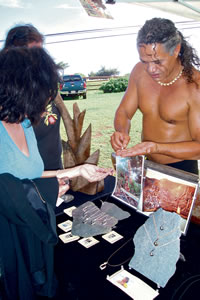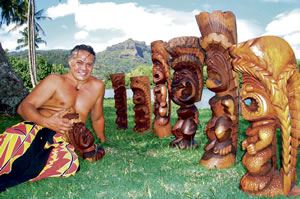Carving A Niche

Keoni Durant perpetuates the ancient tradition of carving tiki. Coco Zickos photos
Like his father before him, Keoni Durant is a lover – and a carver – of beautiful wood. His favorite subject is Ku, the native Hawaiian god of war who, Durant says, is at war only with those who interfere with love
Keoni Durant carries on a family tradition of carving Hawaiian gods from beautiful wood, and hopes his children will continue it
Keoni Durant possesses the inherent ability to transform any piece of wood into an intricate sculpture representative of the Hawaiian culture. Watching him work is like stepping back into ancient times.
“It’s as if something is flowing through him that is coming directly from his ancestors,” says his partner, Heather Shadur. “He goes into what I see as a transformed state.”
Tapping into his Hawaiian ancestry to create his artwork, designed to spread the message of aloha, is an honor Durant appreciates.

Keoni Durant
“I feel grateful that I can see something like this that came out from my own hands,” says the Kaua’i native of one of his many wooden representations of Ku, god of war. “What inspires me is the beauty of the wood inside as I first cut into it. It’s exciting what I see. And as I continue, it becomes more intriguing because it’s taking shape.”
Durant, who says his ancestors were the first ali’i Hawaiian royalty to settle in the Hawaiian archipelago, wishes today’s culture placed more emphasis on lo’i (taro patches and water gardens). He adds his family came to Hanamaulu Beach and traveled up the valley to establish a taro patch.
“Knowledge has very much been lost,” says Durant. “Everyone is busy working, disconnected from their original traits and roots.”
Leading by example and connecting the past to the present through his carvings, he hopes to help bring back that knowledge and encourage others to invest their time and energy into their own natural capabilities.
“I want to make it possible for people to engage in their inherent abilities, and teach them that there is a way to provide sustenance for themselves and others by doing so,” he says.

Durant works on an ali‘i tiki to honor his ancestors
Durant was only 7 years old when he first took an interest in carving, but it wasn’t until later in life that he fully embraced his skills. A descendant of a long line of carvers, Durant’s father, John Pia, was his first inspiration. Durant easily remembers his father’s influence even though Pia, who takes care of Anahola Taro Patch, rarely carves anymore. Despite his early aspirations to carve, Durant had a difficult time figuring out the exact direction to take his life. After attending Kaua’i High School, he worked various jobs on the island such as construction and landscaping, but couldn’t find a good fit. So it was a pleasant surprise when his mentor, Lincoln Young, came into the picture. Durant trained under the master carver for a year and a half and was his only student. Durant still incorporates the style he learned from Young into his carvings today. Primarily carving Ku, Durant emphasizes that the god is a symbol of love, and though he is known as the war god, he is only at war with those who interfere with love.
“So this is a true protector of love,” he says of the tikis.
Every inch of his carvings is symbolic, including Ku’s mouth, which is shaped into the sign of infinity.
Durant calls it “the telephone booth” because it symbolizes that what goes around comes back around.

With girlfriend Heather Shadur and pooch
“If you are not in alignment, it will let you know,” he says.
Ancient Hawaiians used to place these highly representative tikis in households, heiau and temples so that bad vibrations could not enter.
The meaning of the sculptures is even more symbolic for Durant, as his family name is Kealoha Kaliloa, meaning the long wait for love.
“I’ve been taught by my grandmother that god is Kealoha, the love who made aloha,” he says. “So what is most important to me is the culture and passing down this knowledge to the younger generation.”
The statues also serve as a reminder for people to live in a righteous manner.
“The reminder means that we should be representing our bloodline and traits, standing righteously,” says Durant, who lives in Ha’ena. “We should all be like ali’i.”

Chatting with vith visitors at Kealia Market
That’s why he is creating two pieces for public display in Wainiha. They will serve as reminders to not forget the elders and to consider one’s daily actions. In recent years, Durant carved a 9-foot tiki for public display as a gift to the town of Evanston, Ill., located outside Chicago. He was visiting Shadur’s friends and family, and was inspired by the community’s warmth despite the cold winter season and snow he experienced for the first time.
“We literally come from opposite ends of the world,” he says of Shadur, who is originally from Illinois.
They met on a beach in Ha’ena a few years ago while Durant was carving a four-poster bed. It was love at first sight for Shadur, who has since helped him spread the word about his art and its message.
“I believe he’s very deeply rooted in the Polynesian culture and really filled with love,” she says. “I think he would like to have as much abundance as possible to be able to give to everyone who needs.”
She enjoys watching Durant take a piece of wood such as ironwood that has already died and transform it into a beautiful work of art. The public affairs aficionado also likes to see Durant connect to visitors and kama’aina as he relays messages of ancient knowledge.

Durant carves all kinds of tiki
It is at Saturday’s Hanalei Market and Sunday’s Kealia Market that Durant finds the most time to share his wisdom. He not only sells his sculptures and other wooden carvings at these venues each weekend, Durant also offers fishhooks made of silver, gold and Tahitian pearls a craft he has been working on for the past two decades. The fish hooks also have cultural significance and are based upon the original settlers of Kaua’i.
Durant’s work also can be found at various locations including Wailua Marina Restaurant and Hanalei Colony Resort. He sells his crafts at galleries around the island all places that the 51-yearold believes have a connection to the culture.
Though launching a new online store (kauaicarverstore.com) hasn’t left him much time for recreation lately, he likes to pick shells and spear fish.
The father of four adult children, Kehau (33), Kanai (32), Kailani (26) and Keola (22), and grandfather of seven, Durant hopes to pass on his knowledge to future generations. He plans to begin teaching his youngest son the traditions and hopes to extend his legacy of aloha to others.
He also has dreams of creating a Tiki Carver Village where he can have a workshop and museum open to the public, to teach students how to craft Hawaiian sculpture and jewelry to perpetuate the culture.
“He really has a big vision and an even bigger heart,” says Shadur.



